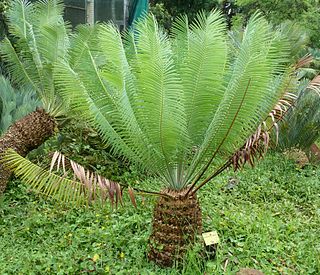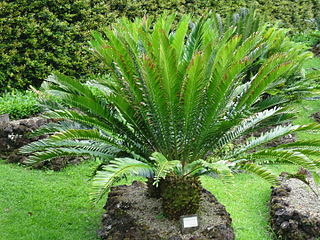
Encephalartos senticosus is a species of cycad in the family Zamiaceae native to the Lebombo Mountains of Mozambique, Eswatini (Swaziland), and the KwaZulu-Natal province of South Africa. Prior to its description in 1996, Encephalartos senticosus had been confused with the closely related and sympatric Encephalartos lebomboensis. Both species are commonly known as the Lebombo cycad.

Encephalartos whitelockii is a species of cycad that is native to Uganda.

Encephalartos turneri is a species of cycad that is native to Mozambique. The Encephalartos turneri was discovered by Ian Sutherland Turner in Nampula, Mozambique.

Encephalartos trispinosus is a species of cycad that is native to the Eastern Cape Province of South Africa.

Encephalartos princeps is a species of cycad that is native to Eastern Cape Province of South Africa.

Encephalartos paucidentatus is a species of cycad.

Encephalartos friderici-guilielmi is a species of cycad that is native to Eastern Cape province and KwaZulu-Natal province of South Africa at elevations of 700 up to 1400 meters.

Encephalartos cycadifolius is a species of cycad that is native to the Winterberg mountains to the north of Bedford in the Eastern Cape province, South Africa. It is found at elevations from 1,200 to 1,800 meters.

Encephalartos middelburgensis is a species of cycad that is native to Gauteng and Mpumalanga provinces of South Africa at elevations of 1,100–1,400 m (3,600–4,600 ft).

Encephalartos kisambo is a species of cycad in the family Zamiaceae. It is known as the Voi cycad.

Encephalartos inopinus is a species of cycad that is native to Limpopo Province, South Africa.

Encephalartos hirsutus is a species of cycad that is native to Limpopo Province of South Africa. It was recorded from three separate localities on south-east-facing quartzite cliffs in the Makuya Nature Reserve bordering the Kruger National Park at elevations ranging from 800–1,000 meters (2,600–3,300 ft) above sea level.

Encephalartos hildebrandtii is a species of cycad in the Zamiaceae family. It is native to Kenya and Tanzania at elevations from sea level to 600 metres (2,000 ft). The species is named for the German explorer Johann Maria Hildebrandt.
Encephalartos schaijesii is a species of cycad endemic to the Democratic Republic of the Congo. It is only found near Kolwezi in Shaba Province, Democratic Republic of the Congo. It occurs in Miombo woodlands.
Encephalartos macrostrobilus is a species of cycad in Africa. It is found only in Moyo District, northwestern Uganda, which is populated predominantly by the ethnic Madi.

Encephalartos septentrionalis, the Nile cycad, is a species of cycad in South Sudan, northern Uganda, northern Democratic Republic of the Congo, and the interior of the Central African Republic.

Encephalartos cerinus or Waxen Cycad is a species of cycad in Africa.

Encephalartos lanatus is a species of cycad, a plant belonging to the family Zamiaceae growing in Mpumalanga, South Africa. Its specific epithet, lanatus, means wooly in Latin.

Encephalartos msinganus is a species of cycad from Kwazulu-Natal.

Encephalartos tegulaneus, the Kenyan giant cycad, is a species of cycad endemic to Kenya. It occurs in Eastern Province near Embu, Kenya, and on the Matthews Range in Rift Valley Province.


















